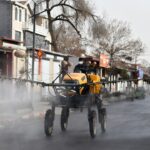Beijing reported two local COVID-19 cases on Monday, including one who works at a local news organization.
The detection of the newly found patients has further expanded the tracing scope of their close contacts, to an extent covering more districts than their working area and housing neighborhood in the capital city.
Experts said such a situation calls for a wider nucleic acid testing, probably the entire Beijing, as there might be more asymptomatic cases.
One 63-year-old female was confirmed on Monday to be infected with the coronavirus after going to a testing institution on Saturday. Another patient, a 46-year-old man who was in close contact with the female patient, also tested positive on Sunday.
The female patient was detected by herself, which means that more positive infections could be out there, Zhang Yuexin, a medical expert based in Northwest China’s Xinjiang Uygur Autonomous Region, told the Global Times on Monday.
Unlike previous cases Beijing reported in recent days in which patients came all from the hardest affected Shunyi district and were detected to be positive during their medical isolation organized by the government, the newly found patients are from the unaffected Daxing district, and the female patient took the initiative to report her infection.
Zhang noted that if the epidemiological investigation of the first patient shows a link with the outbreaks in Shunyi or in Beijing’s neighboring Hebei Province, it may hint the existence of more asymptomatic cases. Thus, a wider scope of the nucleic acid testing is required, probably across the entire Beijing.
Beijing will continue to strengthen the integrated management and control in the regions around the city, said Xu Hejian, a deputy director of Beijing Municipal Propaganda Department, at a press conference on Monday. About 22 million people in three cities of Hebei have been placed under COVID-19 lockdown due to the epidemic outbreak.
The detection of the two new patients also expanded the tracing scope of their close contacts to more of Beijing’s unaffected areas, such as Xicheng and Haidian districts.
The male patient, who works for a newspaper in Beijing’s Xicheng district, had traveled by subway on his way from and back to his home in Daxing.
The office building where the female patient’s daughter works in, which is located in Haidian, was also put into close management mode.
The residential community where both patients live in Daxing was upgraded to a medium-risk region. More than 6,000 residents of the sealed-off community have received nucleic acid tests, said Han Xinxing, a deputy director of Daxing district government, at a press conference on Monday.
A total of 130,000 samples have been collected from people who live in the area and the nearby neighborhood as of 3 pm Monday, he added.
Beijing has six medium-risk regions as of Monday. The other five ones are all from Shunyi.
Villagers queue up to receive nucleic acid testing at a designated site in Chaoyang district, Beijing on January 14. Photo: VCG


